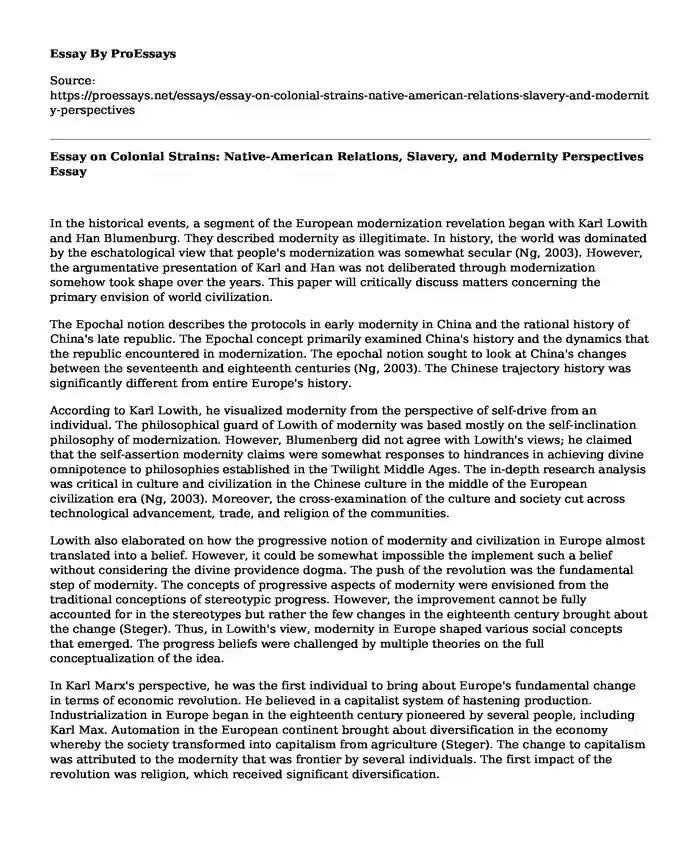In the historical events, a segment of the European modernization revelation began with Karl Lowith and Han Blumenburg. They described modernity as illegitimate. In history, the world was dominated by the eschatological view that people's modernization was somewhat secular (Ng, 2003). However, the argumentative presentation of Karl and Han was not deliberated through modernization somehow took shape over the years. This paper will critically discuss matters concerning the primary envision of world civilization.
The Epochal notion describes the protocols in early modernity in China and the rational history of China's late republic. The Epochal concept primarily examined China's history and the dynamics that the republic encountered in modernization. The epochal notion sought to look at China's changes between the seventeenth and eighteenth centuries (Ng, 2003). The Chinese trajectory history was significantly different from entire Europe's history.
According to Karl Lowith, he visualized modernity from the perspective of self-drive from an individual. The philosophical guard of Lowith of modernity was based mostly on the self-inclination philosophy of modernization. However, Blumenberg did not agree with Lowith's views; he claimed that the self-assertion modernity claims were somewhat responses to hindrances in achieving divine omnipotence to philosophies established in the Twilight Middle Ages. The in-depth research analysis was critical in culture and civilization in the Chinese culture in the middle of the European civilization era (Ng, 2003). Moreover, the cross-examination of the culture and society cut across technological advancement, trade, and religion of the communities.
Lowith also elaborated on how the progressive notion of modernity and civilization in Europe almost translated into a belief. However, it could be somewhat impossible the implement such a belief without considering the divine providence dogma. The push of the revolution was the fundamental step of modernity. The concepts of progressive aspects of modernity were envisioned from the traditional conceptions of stereotypic progress. However, the improvement cannot be fully accounted for in the stereotypes but rather the few changes in the eighteenth century brought about the change (Steger). Thus, in Lowith's view, modernity in Europe shaped various social concepts that emerged. The progress beliefs were challenged by multiple theories on the full conceptualization of the idea.
In Karl Marx's perspective, he was the first individual to bring about Europe's fundamental change in terms of economic revolution. He believed in a capitalist system of hastening production. Industrialization in Europe began in the eighteenth century pioneered by several people, including Karl Max. Automation in the European continent brought about diversification in the economy whereby the society transformed into capitalism from agriculture (Steger). The change to capitalism was attributed to the modernity that was frontier by several individuals. The first impact of the revolution was religion, which received significant diversification.
Moreover, new towns and cities emerged from the industrialization concept in Europe, and the then considered to be big cities expanded their territories due to modernization. Modernity came to actualize in the process of urbanization in various aspects. Nonetheless, the political system diversity came as a result of modernity. Industrialization as a cause of modernity revolutionized the production aspects in the European Communities (Steger). In the political part, a change resulting from modernity in the community led to the leaders extending their powers, and laws were reinforced that could guide the leadership protocols. Durkheim, who belonged to the same social era as Karl, claimed that modernity would differentiate society into organic society.
References
Ng, O. C. (2003, October 2). The Epochal Concept of "Early Modernity" and the Intellectual History of Late Imperial China, Journal of World History. https://www.deepdyve.com/lp/university-of-hawai-i-press/the-epochal-concept-of-early-modernity-and-the-intellectual-history-of-0ZUwtV6i8l.
Steger, M. B. Globalization: A Very Short Introduction. https://books.google.com/books/about/Globalization.html?id=xNyPDgAAQBAJ.
Cite this page
Essay on Colonial Strains: Native-American Relations, Slavery, and Modernity Perspectives. (2023, Dec 28). Retrieved from https://proessays.net/essays/essay-on-colonial-strains-native-american-relations-slavery-and-modernity-perspectives
If you are the original author of this essay and no longer wish to have it published on the ProEssays website, please click below to request its removal:
- Paper Sample on Industrialization
- Why the Confederate Lost the Civil War Essay
- America's History: The Impact of Settlement & Events on Development - Essay Sample
- Essay Example on COVID-19 Impact: US vs. Canada - Uncompared Statistics and Unequal Outcomes
- Paper Sample on Consumer Protection in E-Commerce: Return & Refund Policies
- Founding Fathers Established US Government: Press Protects Citizens' Power - Free Paper
- Comparative Analysis of John Brown and Timothy McVeigh: Terrorism, Motivations, and Methods







